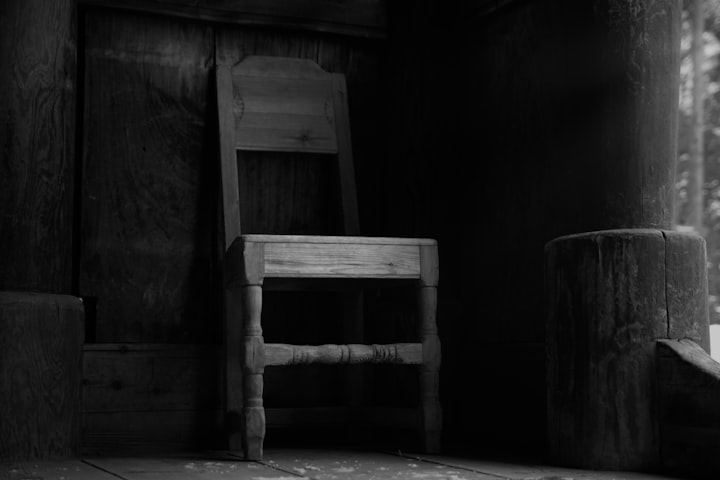The Poet's Chair
Be careful where you sit...

Henry inherited the house on Derwen Avenue from his mother, or rather, his mother had been unable to sell it to pay for her care so it had lay undisturbed for years, whilst his mother had whiled away her twilight years in the best care home that Henry could afford. It wasn't a bad house, no bad things had happened there, but there was something about the place, some feeling, that had prevented it from being sold.
From the outside, it was an ordinary-looking house in an ordinary street, although unlike most of the surrounding houses it had three floors rather than the standard two. His parents had extended the top floor in the Seventies, creating a huge room that spanned the footprint of the whole house, with a large window at the back that afforded views across town.
Henry had done his best, or rather paid his best, to keep the outside of the house in good shape. He was determined to maintain the building so that he could one day sell it, although out of respect for his dear mother, he hadn't moved in, or even entered the property until she passed away. After the funeral, and the respects paid by people he didn't know, he returned to the house on Derwen Avenue.
First, he planned to make an inventory of everything in the house and divide it between what was saleable, and what needed to be thrown out. Henry planned to start in the attic level and move his way down. He hadn't been up there in years, not since his father had passed. His mother had everything covered in dust sheets and closed the door to the top floor. She never spoke of it, but in those years living alone in the house, Henry often caught her staring up at the ceiling.
The cleaning day began like any regular day. Henry began pulling the dust sheets off the furniture and shifting cardboard boxes to the doorway so he could sort their contents easily. By lunchtime there was one large dust sheet left, over a tall piece of furniture at the back of the room. Henry walked up to it, and like a magician pulling a tablecloth without disturbing the plates, whipped the last dust sheet and folded it with dramatic flair.
Underneath was an intricately-carved chair fashioned from dark wood. It looked to Henry's untrained eye to have been made from a single piece. He ran his fingers over the Celtic knotwork design, surprised to find a face surrounded by leaves where a person's head would have rested, and wondered how old it was. There was no dust on it but it would need polishing before it could be sold.
It was a solid, heavy-looking thing, and he wondered how it had come to be on the top floor. The chair was so cumbersome it must have taken a lot of effort to move it up there. Henry didn't remember any fuss about moving furniture to the top floor. And he didn't remember either of his parents ever mentioning the exquisitely-carved item that they surely would have wanted to display.
That night he stayed in the house, not wanting to leave until the task was done. He slept in his old room, which was so much smaller than he remembered it. As he closed his eyes a strange voice seemed to whisper in his ear:
'A oes heddwch?'
His eyes snapped open. The room was empty. He sat upright in bed and switched on the bedside lamp. Nothing was out of the ordinary. His window was shut, but he knew that these old properties often breathed of their own accord. He convinced himself it was just the wind, and lay back down to sleep.
Dreams came to him quickly - flashes of images without any kind of order. His parents, the house, strange men clad in white sheets, a shining sword being drawn from its scabbard, and the big, dark chair with its dust sheet billowing in the wind. Through it all he heard that voice:
'A oes heddwch?'
When Henry awoke in the morning he remembered it all, and remembered what drew all the fragments together. He lay in bed, listening to the house creaking around him, and a single word escaped his lips. A word he hadn't heard since school, since childhood:
'Eisteddfodau.'
He thought back to his school days - the Eisteddfod was a cultural event held in schools on or around March 1st. Prizes were given for competitions in singing, poetry, writing and other artistic pursuits. There were larger national, and international Eisteddfod events - artistic olympiads - but he had never attended any himself. Henry couldn't remember his parents attending one either.
The highest accolade in an Eisteddfod was the bardic chair - a new chair was carved each year from wood for the winner of the poetry event. During the closing ceremony of the event, the archdruid would pull a sword from its scabbard and ask if there was peace. The crowd, if in agreement with the winner's announcement, would affirm that there was, indeed, peace.
Henry was mystified by the chair - he was confident in his assumption that it was a bardic chair, that it potentially held great cultural value - but he had no idea why either one of his parents would have had it in the house. The question was what to do with it? He might be able to offload it to a specialist antique dealer, but he was curious about the chair's past, and how it came to be in his parents' house.
As the emptying of the house began, and furniture was sold off item by item, Henry tried his best to research the chair. The vivid images of his dreams haunted him day and night, his only respite was the hours he spent obsessing over the chair's past. There were bardic chairs up and down the country stretching back almost a thousand years. Which one this was, he couldn't tell, and how he was meant to find out, he wasn't sure. His research came up empty handed, until the day the museum called.
Arwyn Saunders, head of collections at one of the museums he had approached, called one day and asked to come and see the chair. Henry was happy to oblige, as the house was mostly empty and he wanted rid of the item so that he could sell the property.
Upon his arrival Henry guided Arwyn quickly to the top floor. He had managed to push the chair half-way to the door, and had given up. It now sat in the centre of the room with its dust sheet folded up neatly on one arm.
'Beautiful carvings,' Arwyn mused, tracing his finger along the knotwork just as Henry had done the day that he found it.
Henry suddenly felt defensive. The hairs on the back of his neck stood up. His thoughts bounced from wanting the man to leave, to keeping him there until he told him all he knew. It was strange to think, but he almost felt jealous of Arwyn and whatever knowledge he had of the chair.
'And you say you don't know where it came from?' Arwyn asked.
Henry shook his head. 'I assumed it was a bardic chair.'
'Yet you say neither of your parents were Eisteddfod bards?'
'If they were, they never talked about it.'
'I don't suppose your father was a carpenter? He could have made it?'
'No, he was an accountant.'
'Perhaps the chair was here when they moved in?'
'The house has been in the family for generations, so it's entirely possible.'
'Interesting,' Arwyn straightened up and removed the dust sheet from the arm of the chair, and ran his palm over the carved wood beneath, 'it's an old one, that's for sure. The dark colour of the wood, the design of the carvings...it's not a recent piece.'
'How much?' The words escaped Henry's mouth before he could he could stop himself.
Arwyn shrugged, 'The Museum tends to have pieces donated to it, rather than purchasing them. At any rate, I don't think we'd be able to afford it - it's so old, it's entirely irreplaceable. I can call a valuer friend of mine if you like, he could let you know how much it might be worth for insurance purposes.'
'Insurance purposes?'
'I mean you wouldn't be able to get one like this if anything happened to it.'
Henry frowned. 'What could happen to it?'
Arwyn shrugged again, 'It's unlikely to be stolen, given its size. But fire, woodworm, or rot? There are plenty of things that could go wrong. Best to have it valued and insured if I were you.'
'What about removing it from the premises? I'm trying to sell the house.'
'I would insure it before you move it. Just for your peace of mind.'
Henry agreed to have a valuer visit to price up the chair. Arwyn took a few photos of the carvings to help with identifying the chair, and said he would be in touch. Henry waved him off and closed the door, leaving himself alone in the house with the chair. The voice returned to him:
'A oes heddwch?'
'Who is that?!' He shouted. There was no reply. He switched the lights on in every room, moving methodically through the house from the ground floor up to the attic level. Most of the rooms were completely bare now, so he was able to quickly check over the house. Still the voice whispered, sometimes ahead of him, at other times behind. Try as he might, Henry couldn't find the source, and so he made him way up to the top floor, and exhausted, sat in the bardic chair.
A few days later, Arwyn returned to the house on Derwen Avenue. The door creaked open as he knocked on it, and he stepped inside the empty hallway.
'Henry?' He called, looking around. The lights were all on, despite it being a sunny day, 'anyone home?'
Arwyn jumped at a sound from above his head - a thumping sound followed by heavy scraping. He followed the sound up to the first floor, looking up at the ceiling all the time. When he reached the foot of the stairs to the top floor, he could see a shape in the gloom - the lights had been switched off upstairs.
'Henry, is that you?' Arwyn said, climbing the stairs. He reached a light switch and flicked it on with a gasp.
Henry was sat in the bardic chair, bolt upright, staring straight ahead. He was unshaven and looked worn out and bedraggled.
'Whats happened to you?' Arwyn asked.
This broke Henry's reverie, and he looked at his visitor.
'What are you doing here?'
'My valuer friend said he hadn't heard from you so I thought I'd check in. Are you alright?'
'Never better.'
'You'll be happy to know I managed to identify the chair from its carvings.'
'Have you?'
'Bit of a story behind it - there was an argument between two potential winners at an Eisteddfod, and one of the men stole the chair before it could be awarded. It was never seen again, and he was never at peace.'
'You don't say?'
Arwyn stepped into the room and Henry tilted his head to one side, as if he were listening to someone close by. Henry smiled.
'I think you should go.' He said.
Arwyn stopped. 'I'm sorry?'
'I said go! I've decided I'm keeping the chair, and the house.'
'But you've sold everything. There's nothing here for you!'
'I have everything I need right here,' Henry said, tapping the arms of the chair and standing up, 'and you need to go.'
'I don't understand.'
Henry rushed at Arwyn, who stumbled back out of the room. The voice was shouting in Henry's ear now, no longer a whisper. Arwyn held his hands up to protect himself, but Henry barged him, pushing him backwards and sending him tumbling down the staircase to the floor below.
Henry stood at the top of the stairs looking down at Arwyn's broken body. The voice came to him again:
'A oes heddwch?'
'Heddwch,' he answered grimly, and returned to sit in the poet's chair.
About the Creator
Daniel Lyddon
Writer-producer, and co-founder of UK production company Seraphim Pictures. Welshman scratching the Hollywood itch since 2005. Interests include film, travel and fitness, so will be writing about them, plus occasionally bipolar disorder...






Comments
There are no comments for this story
Be the first to respond and start the conversation.